
Chapter 11
OTHER EEO AND EMPLOYMENT LEGISLATION: FEDERAL AND STATE LAWS
INTRODUCTION
The eleventh chapter focuses on the law dealing with discrimination in employment. There are various
statutes and executive orders that seek to eradicate employment discrimination. There are many types of
employment discrimination and prohibited acts. This chapter will examine the laws that the employers must
comply with.
CHAPTER OUTLINE
The Civil Rights Acts of 1866 and 1870
Generally
Passed during the Reconstruction era right after the Civil War.
Intended to ensure that newly freed slaves were granted the full legal rights of a U.S. citizen.
Section 1981
Allows for individual suits for damages for intentional discrimination based on race or color.
Gives citizens of any color the same right to make and enforce contracts in every state.
Jones v. Alfred H. Mayer Co. held that the law could be used to attack discrimination in
private employment.
Johnson v. Railway Express Agency held that the law provided for an independent cause of
action against employment discrimination. (Separate and distinct from a suit under Title VII)
Patterson v. McLean Credit Union held that the law covered only those aspects of racial
discrimination in employment that related to the formation and enforcement of contracts and did not
cover harassment based on race. The Civil Rights Act of 1991 added a section that overturned the
Patterson case by defining “making and enforcing contracts” to include the enjoyment of all benefits,
privileges, terms and conditions of the contractual relationship.
The 1991 act also added a right to sue for compensatory and punitive damages to victims of
intentional discrimination in violation of Title VII, the ADA, and the Rehabilitation Act.
Plaintiffs may sue under Section 1981 to challenge racial or ethnic harassment or retaliation.
Section 1983
Restricted to claims of intentional discrimination. (Like Section 1981)
Extends to the deprivation of any rights guaranteed by the Constitution or law. (Unlike
Section 1981)

Cihon/Castagnera, Employment and Labor Law, 9e Instructor’s Manual Chapter 11
Maine v. Thiboutot held that the law encompasses claims based on deprivation of rights
granted under federal statutory law, thus claims alleging discrimination on grounds prohibited by
federal law (gender, age, religion, national origin, etc.) can be brought. However, because of the
wording, claims under this section are limited to cases where the alleged discrimination is by
someone acting or claiming to act under governmental authority. (Public employers are subject to
suit, but most of the time private employers are not).
Brown v. GSA held that the only remedy available to federal government employees
complaining of race discrimination in employment is provided by Section 717 of Title VII.
Section 1985(c)
Prohibits two or more persons from conspiring to deprive a person or class of persons “equal
protection of the laws, or of equal privileges and immunities under the law.”
Enacted to protect African Americans from the violence of the Ku Klux Klan.
Lower courts have ruled that this section cannot be used to sue based on alleged violations of
the Equal Pay Act or the Age Discrimination in Employment Act.
Procedure Under Sections 1981 and 1983
A suit under Section 1981 is not subject to the same procedural requirements as a suit under
Title VII.
No requirement to file a claim with any administrative agency (EEOC) before filing suit
under these sections.
Plaintiff may file in federal court and request a jury trial.
Punitive damages are available in addition to compensatory damages.
Executive Order No. 11246
Generally
Provides the basis for the federal government contract compliance program.
Firms doing business with the federal government must agree not to discriminate in
employment based on race, color, religion, national origin, or gender.
Equal Opportunity Requirements
The contract compliance program is administered by the U.S. Secretary of Labor through the
Office of Federal Contract Compliance Programs (OFCCP).
All firms having contracts or subcontracts exceeding $10,000 with the federal government
must agree to include a no-discrimination clause in the contract.
Contractor must advertise that all qualified applicants will be considered without regard to
race, color, religion, gender, or national origin.
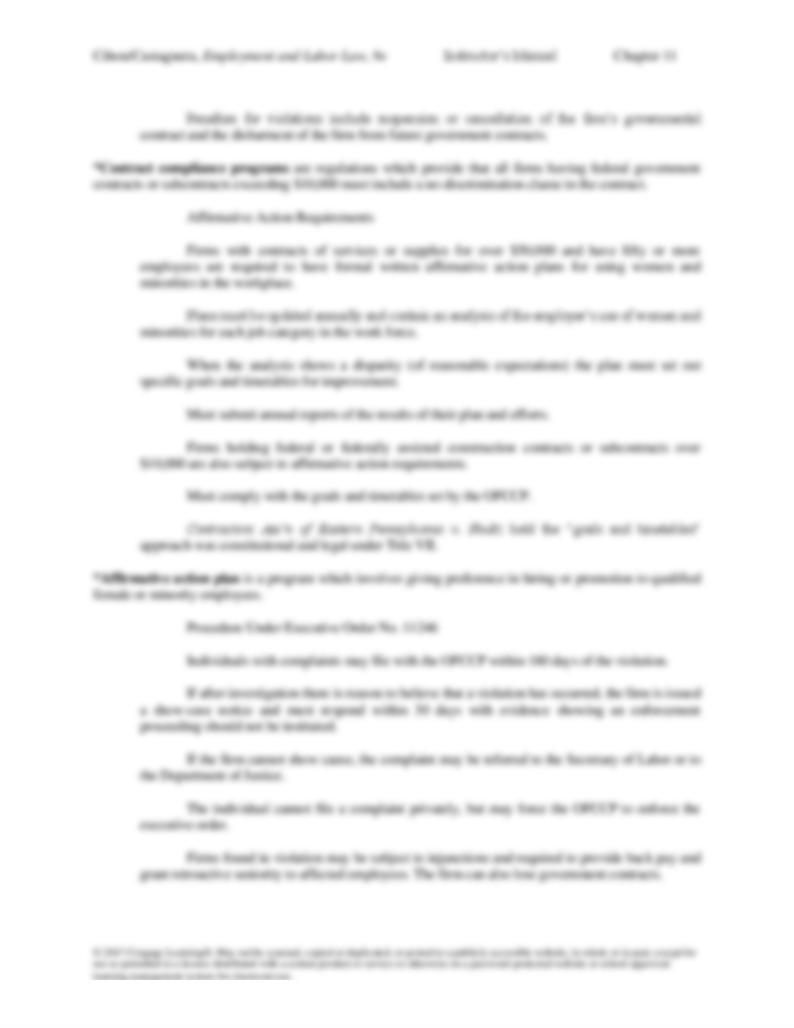
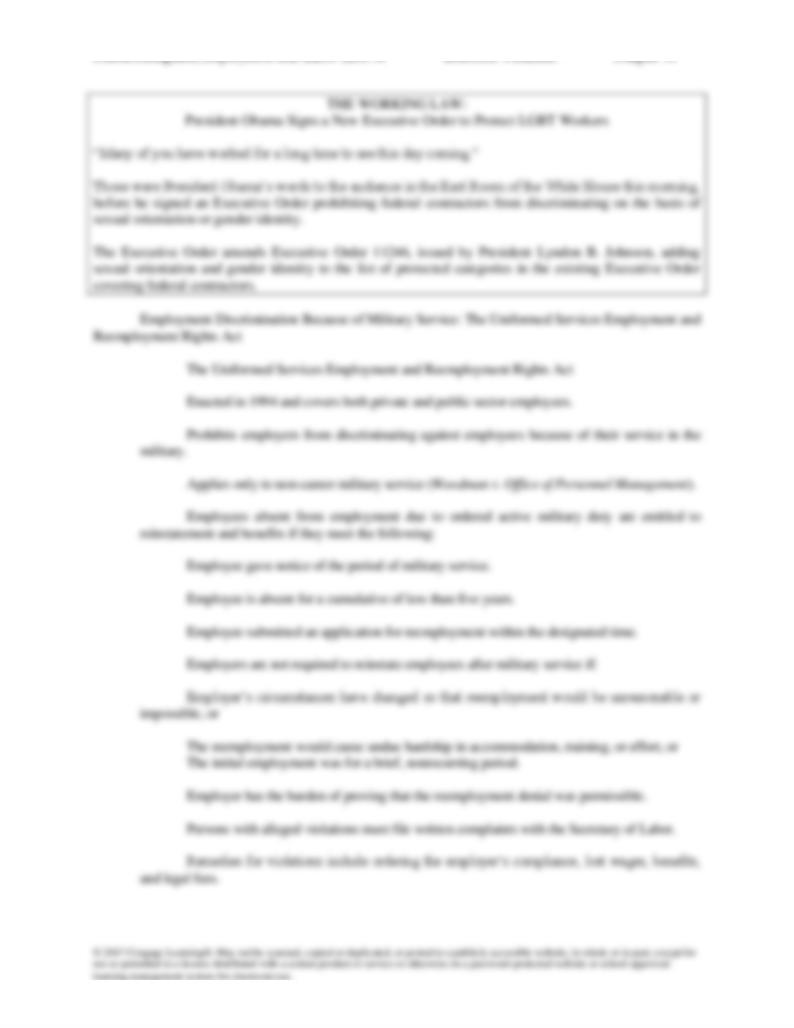
Cihon/Castagnera, Employment and Labor Law, 9e Instructor’s Manual Chapter 11
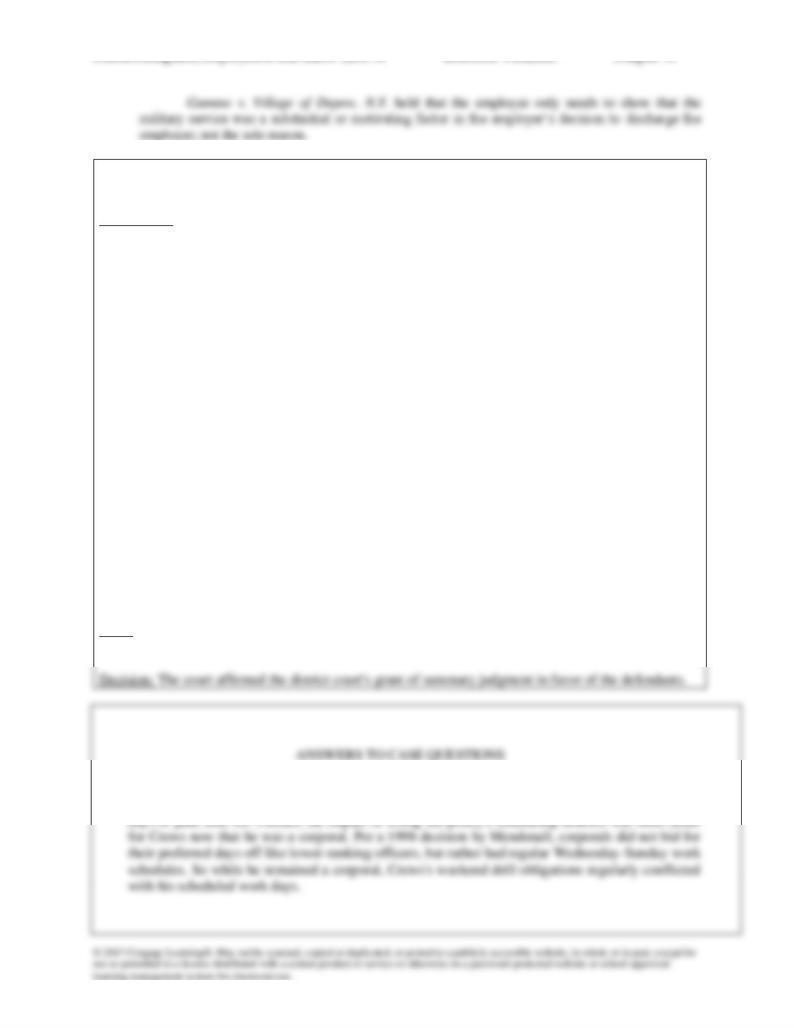
Cihon/Castagnera, Employment and Labor Law, 9e Instructor’s Manual Chapter 11
CASE 11.1 CREWS v. CITY OF MT. VERNON
567 F.3d 860 (7th Cir. 2009)
Background: Ryan Crews had been a member of the Army National Guard since 1988 and an officer of
the Mt. Vernon Police Department since 1997. As a member of the Guard, Crews was required to attend
weekend training and preparedness exercises (“drills”) about once a month. The Chief of Police,
Mendenall, had the authority to establish officers' weekly work schedules, which consisted of five, eight-
hour shifts and two days off. For nine years, the City of Mt. Vernon allowed police officers, who missed
their weekend work shifts, to attend National Guard duties to work on their scheduled days off to make
up the lost time. The City did not provide a comparable scheduling benefit to non-Guard employees who
missed work for non-military activities. Crews's weekend drill obligations frequently conflicted with his
work schedule. When such a conflict arose, the City would grant Crews and other Guard employees
military leave to attend drill. This leave was unpaid, but Guard employees could turn in their military
pay for attending drill and in exchange receive their regular City pay. Guard employees could also
allocate their accrued vacation days, personal days, and compensatory time off to cover days missed for
drill, thereby collecting City pay and military pay for time spent at drill. The Department also
maintained a policy for several years that allowed Guard employees to reschedule work shifts that fell on
drill weekends. When the Department had hired two additional Guard members, Mendenall rescinded
the work scheduling policy. Following the rescission of the scheduling policy, Crews tried to persuade
Mendenall to continue allowing him to reschedule his work days missed for drill, but Mendenall refused.
Because of the rescission of the work scheduling policy, Crews was no longer able to collect a full
week's pay from the City when he missed a weekend shift for drill, unless he used up his limited days of
paid time off. In December 2006, Crews filed a complaint against the City of Mt. Vernon and
Mendenall, alleging that the rescission of the work scheduling policy denied him a benefit of
employment based on military status, in violation of USERRA, and that defendants retaliated against
him for opposing the rescission of the policy by making negative comments toward Crews and denying
him advancement opportunities.
Issue: Is the City required to give Crews preferential work scheduling benefits not generally available to
non-Guard employees? Did defendants retaliate against Crews?
1. Since the rescission of the work scheduling policy, Crews was no longer able to collect a full
week's pay from the City when he missed a weekend shift for drill, unless he used up his limited
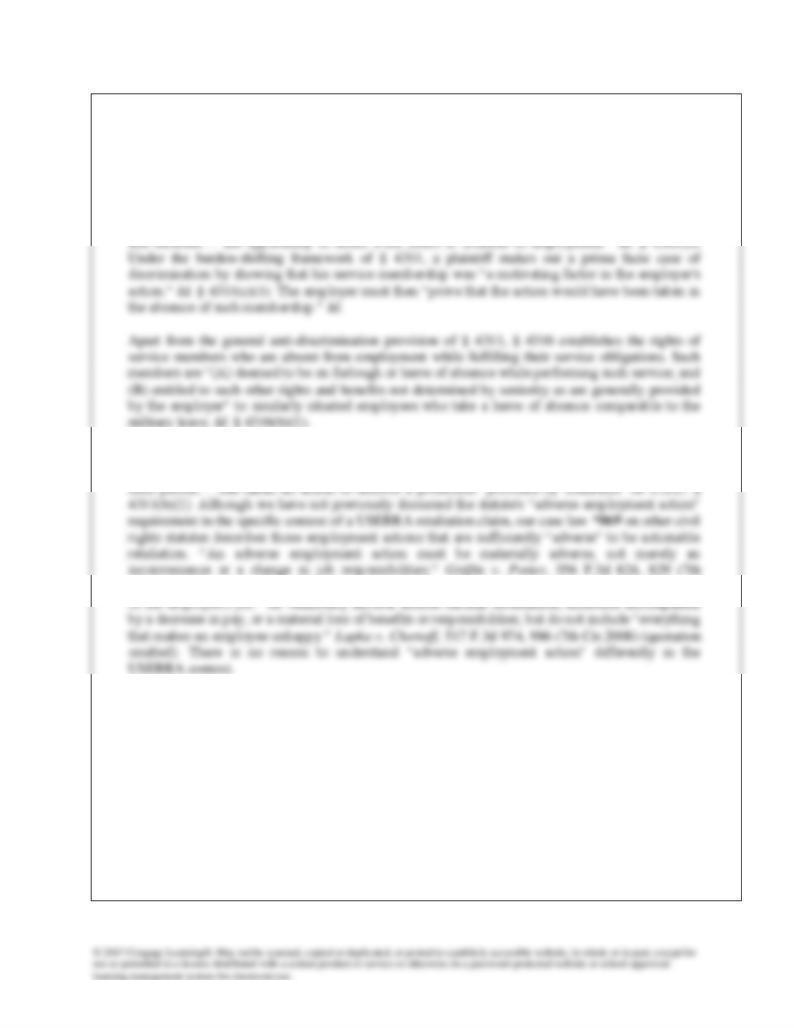
Cihon/Castagnera, Employment and Labor Law, 9e Instructor’s Manual Chapter 11
2. USERRA affords broad protections to service members against employment discrimination,
providing that members “shall not be denied initial employment, reemployment, retention in
employment, promotion, or any benefit of employment by an employer on the basis of that
membership....” 38 U.S.C. 4311(a). A “benefit of employment” means “any advantage, profit,
privilege, gain, status, account, or interest (other than wages or salary for work performed) that
accrues by reason of an employment contract or agreement or an employer policy, plan, or practice
3. In addition to protecting against discrimination on the basis of service membership, § 4311
prohibits an employer from taking “any adverse employment action against any person because
Cir.2004). “An adverse employment action is one that significantly alters the terms and conditions
4. The undisputed evidence indicated that Crews received alternative, non-FTO training
commensurate with his corporal rank. Crews testified that he attended classes in “first line leader
management” and “critical incident management,” instruction geared toward officers who fulfill a
more supervisory role. A log prepared by Deichman also indicated that Crews had completed the
third-highest amount of command staff training hours for the period between May 2005 and
December 2006-a significant accomplishment, since Crews, having been promoted to corporal in
May 2006, was only a command officer for about a third of that period. The Department did not
deny Crews training opportunities, and the court did not see how changing the specific classes
offered based on the officer's rank would dissuade a “reasonable employee” from asserting his
USERRA rights. Burlington, 548 U.S. at 68, 126 S.Ct. 2405. Accordingly, Crews failed to establish
a materially adverse employment action, and the district court properly granted summary judgment
for the defendants on Crews's retaliation claim.

Cihon/Castagnera, Employment and Labor Law, 9e Instructor’s Manual Chapter 11
Military Family Rights Under the FMLA
In 2013, the U.S. Department of Labor (DOL) issued new regulations operationalizing
expanded Family and Medical Leave Act rights for members of the armed forces and their
families.
The DOL’s final rule springs from the 2010 Defense Authorization Act and affords
significantly expanded leave rights for injured servicemen and women, as well as new
intermittent-leave rights for spouses and other family members.
Caregiver rights under the new regulations extend to situations in which the medical
condition arises after the injured, ill, or disabled veteran has separated from the service.
The National Labor Relations Act
United Packinghouse Workers Union v. NLRB held that race discrimination by an employer
was an unfair labor practice.
Frank Briscoe Inc. v. NLRB held that retaliation against employees who file charges with the
EEOC, by refusing to recall them from layoff, was a violation.
Syres v. Oil Workers held that unions that discriminate against African Americans in
membership or conditions of employment are in violation.
Hughes Tool Co. held that a union’s refusal to represent African American workers violated
the act and was grounds to rescind the union’s certification as a bargaining unit.
NLRB v. Glass Bottle Blowers Local 106 held that discrimination against female employees
by a union was a violation.
Constitutional Prohibitions Against Discrimination
Due Process and Equal Protection
Fifth Amendment applies to federal government.
Fourteenth Amendment applies to state and local governments.
Challenges to employment discrimination involve claims that the discriminatory practices
deny the victims’ rights or treatment equal to those who are not targets of the discrimination.
Washington v. Davis held that the constitutionally prohibitions only applies to invidious or
intentional discrimination; disparate impact was not enough.
Court’s Considerations:
Basis of discrimination—involvement of a suspect class.
Discriminations based on race will require the government to show the treatment is required
because of a compelling government interest and that no less discriminatory alternatives existed.
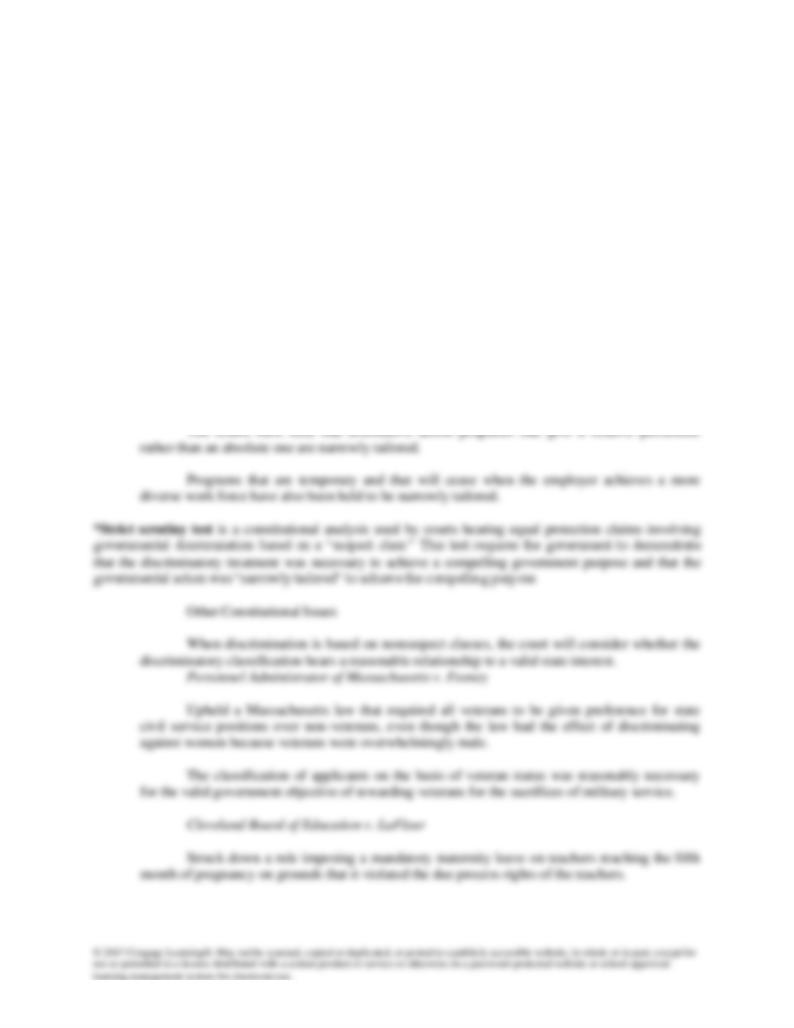
Cihon/Castagnera, Employment and Labor Law, 9e Instructor’s Manual Chapter 11
*Suspect class is a basis of discrimination, classification, or differential treatment—such as race, color,
gender, religion or national origin—by government action, for which there is insufficient legitimate
justification for treating persons because of such characteristics.
Affirmative Action and the Constitution
Adarand Constructors, Inc. v. Pena held that federal government affirmative action
programs giving preferential treatment based on race or color must be justified under the strict
scrutiny test.
Strict Scrutiny Test: government must demonstrate that the action was necessary to achieve
a compelling government purpose and that the program was “narrowly tailored” to achieve that
purpose. It must also be shown that it did not unduly harm those who were not given the preferential
treatment.
Achieving student diversity was held to be a compelling governmental interest in Grutter
v. Bollinger and Gratz v. Bollinger. However, more recently, it was held that diversity in
education was not a sufficient justification for the school’s use of racial classifications in
assigning students to particular schools.
The courts have held that affirmative action programs that give a relative preference
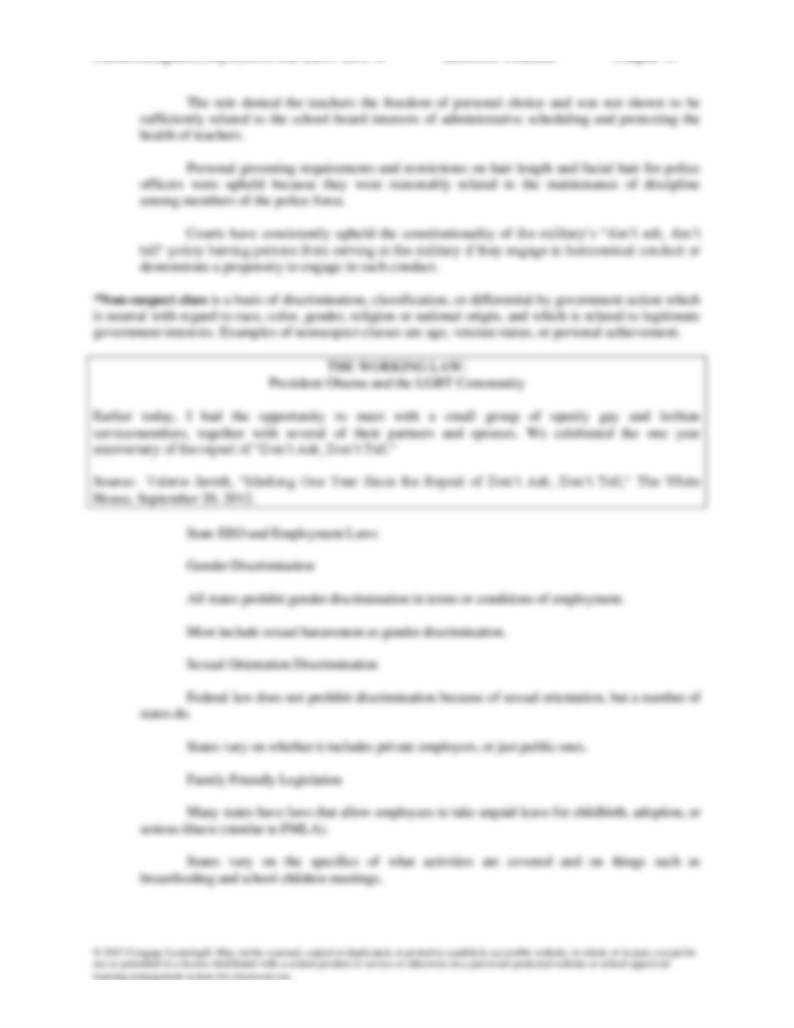
Cihon/Castagnera, Employment and Labor Law, 9e Instructor’s Manual Chapter 11

Cihon/Castagnera, Employment and Labor Law, 9e Instructor’s Manual Chapter 11
CASE 11.2 HENRY V. CITY OF DETRIOT
234 Mich.App. 405, 594 N.W.2d 107 (Mich. Ct. App. 1999),
appeal denied, 461 Mich. 937, 606 N.W.2d 24 (Mich. 1999)
Facts: Plaintiff was a police officer who served on an investigatory board. Plaintiff’s superior precluded
the board from performing its job. Plaintiff was later called to testify regarding the board’s activities and
stated that he was precluded from doing his job by his superior. Plaintiff was later fired and filed suit
under Michigan’s whistleblower law. A jury found that the plaintiff was retaliated against and awarded
damages.
Issue: Did the plaintiff present prima facie evidence of retaliation?

Cihon/Castagnera, Employment and Labor Law, 9e Instructor’s Manual Chapter 11
CASE 11.3 CUMMINGS V. WASHINGTON MUTUAL
650 F.3d 1386 (11th Cir. 2011)
Facts: In February 2007, the manager of the Piedmont Commons branch of Washington Mutual Bank
conducted a cash audit and discovered a shortage of approximately $58,000. The entire amount was
missing from two Teller Cash Dispenser machines that Cummings, the previous branch manager, had
access to during his employment at the branch. The manager hired two fraud investigators to look into
the shortage. They reviewed surveillance-camera still images that they believed showed Cummings and
his employees repeatedly violating Defendant's Dual Control Policy, which requires two persons to be
present when cash is handled or certain secure areas are accessed. Several current and former employees
at the branch told the investigators that Cummings had repeatedly violated the policy during his tenure as
branch manager. The investigators also interviewed Cummings, and then asked him to take a polygraph
test; he declined to do so. On 19 March 2007, Cummings’ employment was terminated; he was told by
his supervisor that he was being terminated because of his violations of the Dual Control Policy, and not
because he refused to take a polygraph test. After his termination, Cummings filed a complaint against
Washington Mutual with the Department of Labor, alleging that Washington Mutual had violated the
Employee Polygraph Protection Act [EPPA]. After the Department of Labor informed him that his
claims could not be substantiated, Cummings filed suit against Washington Mutual alleging, among
other claims that the bank violated the EPPA. The district court granted summary judgment for the bank
on all counts. Cummings appealed.
Issue: Did the request by Washington Mutual that Cummings take a polygraph test violate the EPPA?
Decision: Because the employer requested Cummings to submit to a polygraph test in connection with
an “ongoing investigation” of a specific incident in which the employer had a “reasonable suspicion”
that Cummings was involved, the court of appeals affirmed the trial court’s dismissal of Cummings’
EPPA claim.
Honesty Testing
These are paper and pencil tests and my use psychological profile testing.
Not prohibited by federal or most state law like lie detector test.
Seek to measure such behaviors as:
Truthfulness
Perceptions about the pervasiveness of employee theft
Illegal drug use
Admissions on theft
*Honesty test is an employment test used by employers as a screening devise to evaluate employees or
applicants on various workplace behaviors such as truthfulness, perceptions about employee theft, admissions
of theft, and drug use.
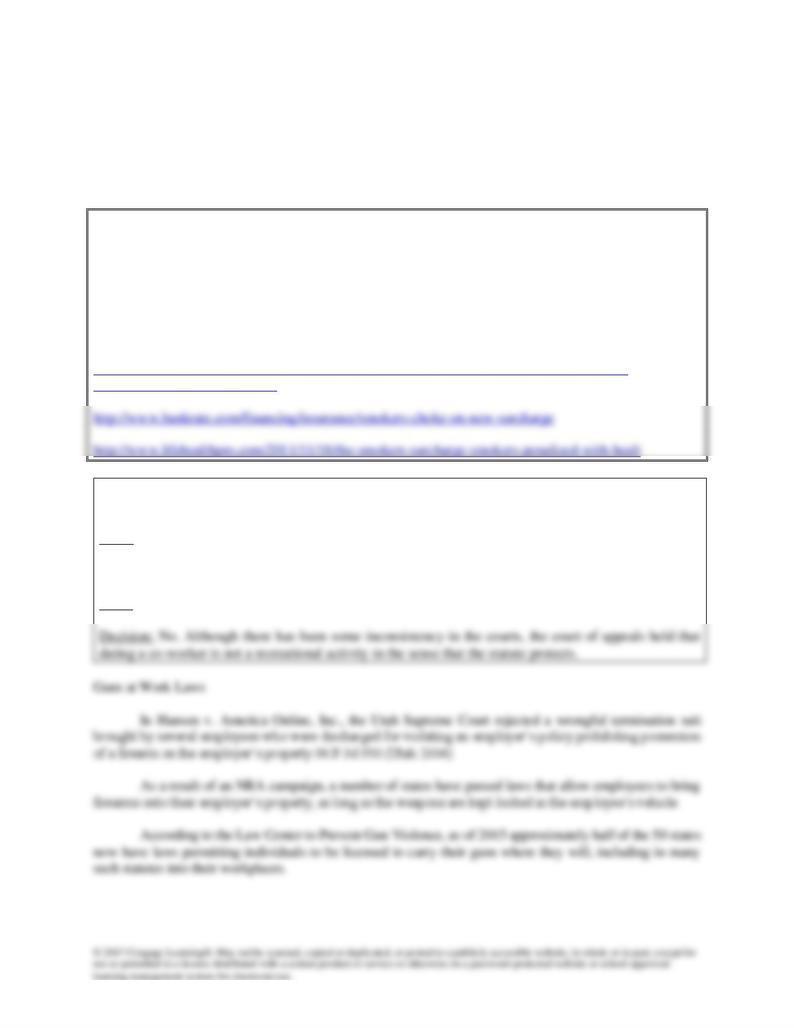
Cihon/Castagnera, Employment and Labor Law, 9e Instructor’s Manual Chapter 11
Off-Duty Conduct
Many states have laws that protect employees from discrimination based on their lawful, off-
duty conduct.
Mainly designed to protect smokers and tobacco users.
ETHICAL DILEMMA
An Additional Charge for Smokers?
It is a well-known fact that smokers and tobacco users have a greater number of health issues and thus
costs than those who do not use those products. Whether or not these individuals should have to pay some
sort of surcharge on their health insurance premiums is the topic of much debate.
See additional commentary at:
http://www.nytimes.com/2011/11/17/health/policy/smokers-penalized-with-health-insurance-
premiums.html?pagewanted=all
CASE 11.4 MCCAVITT V. SWISS REINSURANCE AMERICA CORPORATION
237 F.3d 166 (2d Cir. 2001) (per curium)
Facts: Plaintiff entered into a relationship with a co-worker and was eventually denied promotion and
discharged. Plaintiff filed suit under the New York Labor Law stating he was discriminated against
based on recreational activity outside of work. The trial court dismissed the claim.
Issue: Is dating a co-worker a protected recreational activity?
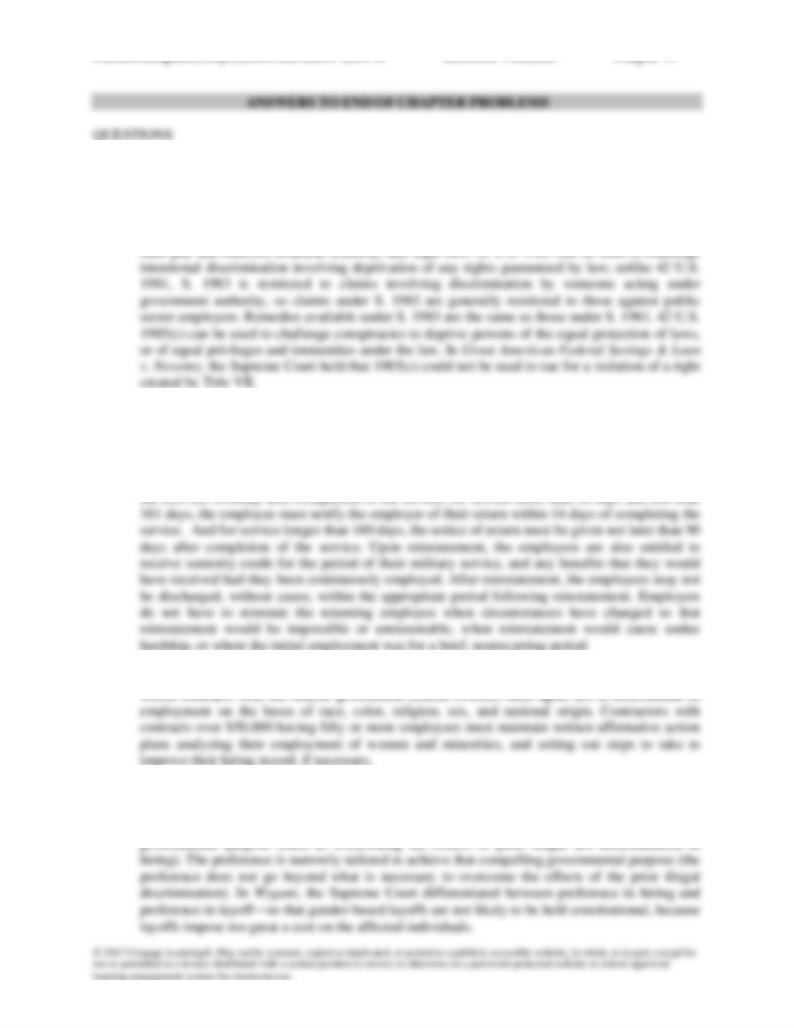
Cihon/Castagnera, Employment and Labor Law, 9e Instructor’s Manual Chapter 11
1. 42 U.S. 1981 can be used against intentional discrimination based on race. In St. Francis College
v. Al-Khazraji the Supreme Court held that S. 1981 can be used to challenge discrimination
directed against someone of Arabian ancestry⎯the section was intended to protect identifiable
classes of persons who are subject to intentional discrimination solely because of their ancestry or
ethnic characteristics. Remedies available include reinstatement or hiring, monetary damages,
2. Employees who are serving in, or have served in the armed forces or the reserves are protected
under the USERA. The Act provides that if the employees have given the employer appropriate
advance notice, and the length of their military service is not longer than 5 years, the employees
are entitled to re-employment at the completion of their service, if they report to the employer
within the appropriate period. Employees with service less than 31 days are to report for work on
3. E.O. 11246 imposes an affirmative action obligation on government contractors. Contractors
4. Public sector employers who give preference in hiring to females must comply with the
constitution⎯the preference must pass the strict scrutiny test because gender is a "suspect class."
The employer must demonstrate that the preference is necessary to achieve a compelling
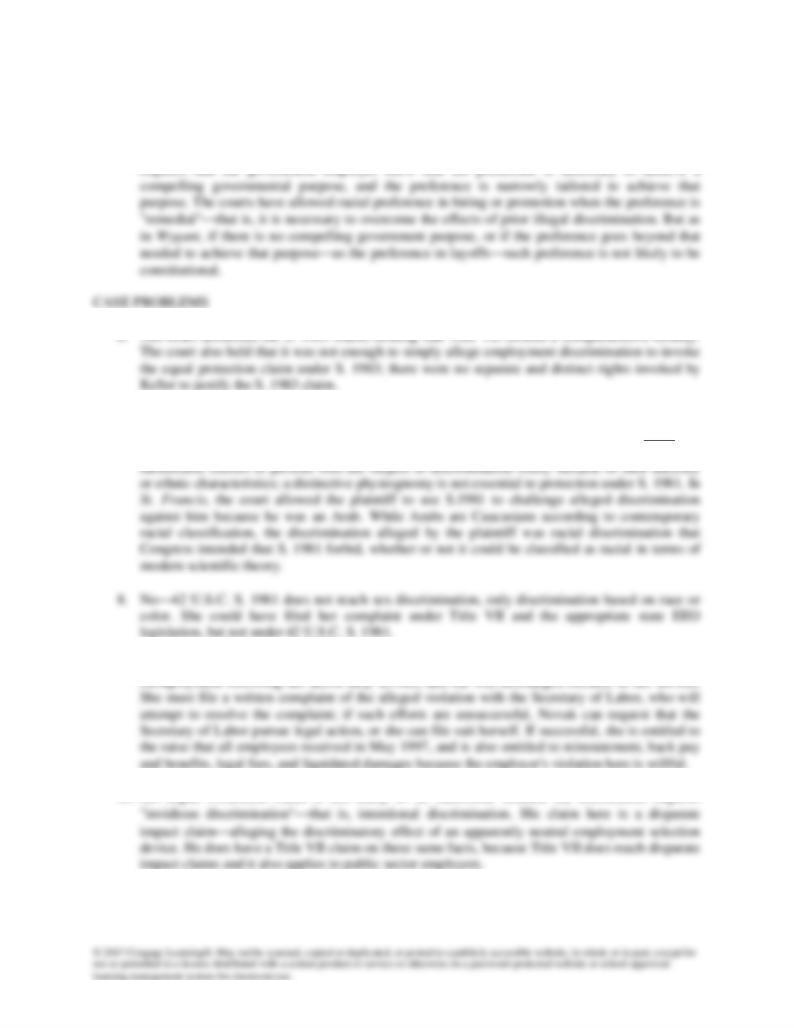
Cihon/Castagnera, Employment and Labor Law, 9e Instructor’s Manual Chapter 11
5. Race-based employment preferences, or discrimination, by federal employers is not prohibited,
but the courts will examine such preference very closely⎯the preference must pass the strict
scrutiny test, as indicated in Wygant, because race is a "suspect class." The strict scrutiny test
6. The court dismissed the S. 1983 claim, holding that Title VII offered a comprehensive remedy.
7. The court here held that Davis’ claim was one of national origin discrimination, and was not
mingled with a racial discrimination claim. Therefore the S. 1981 claim was dismissed. Note: The
Supreme Court held in St. Francis College v. Al-Khazraji that S.1981 can be used to protect
9. Novak has a valid claim under USERA; her employer fired her within 180 days of her
10. His Equal Protection claim is not likely to be successful because the constitution requires
11. Bonacorsa could file suit under the New York State Human Rights Law, which prohibits
discrimination based on criminal record, and under the U.S. Constitution⎯alleging denial of
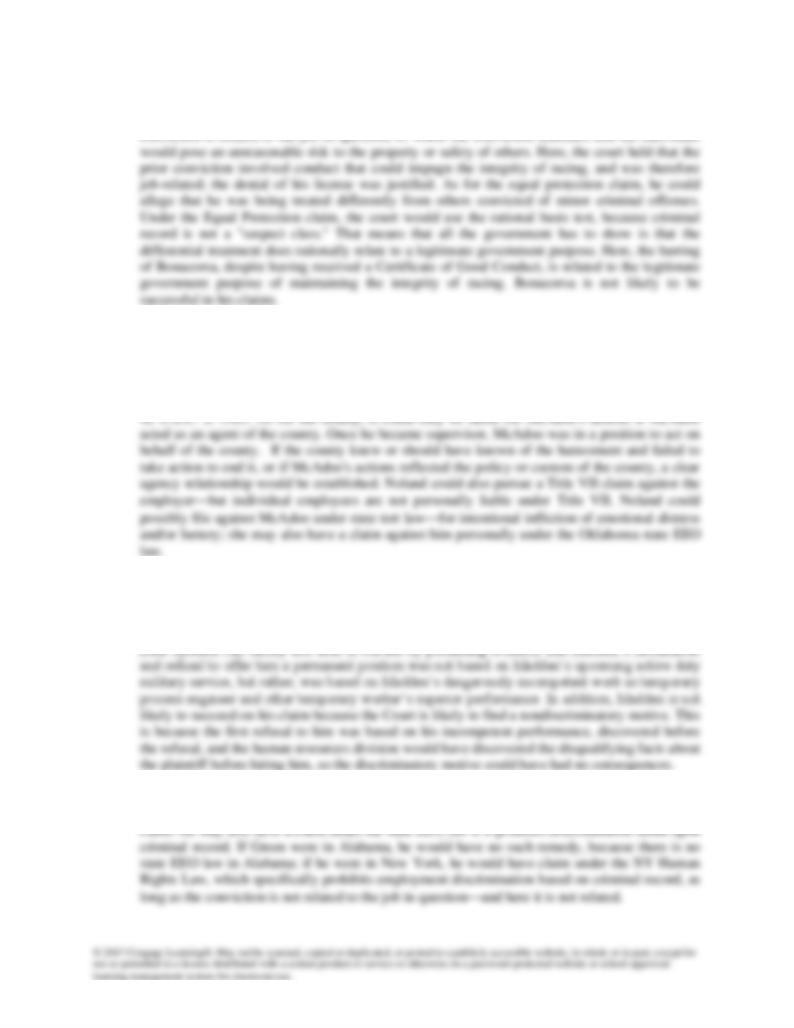
Cihon/Castagnera, Employment and Labor Law, 9e Instructor’s Manual Chapter 11
equal protection under the 14th Amendment. Although the NYS Human Rights Law does prohibit
discrimination based on criminal record, it does allow such discrimination where the prior
12. Noland can pursue a claim against McAdoo under 42 U.S.C. S.1983 for the sexual harassment
once McAdoo becomes her supervisor⎯because at that point, he is acting with the legal authority
of his position. The harassment by McAdoo prior to his becoming supervisor is not likely to be
actionable under S. 1983⎯the section requires that the alleged violation be taken "under the color
of law"⎯that is, pursuant to a claim of legal authority. McAdoo could be personally liable under
13. In order to establish a claim under USERRA, Madden must present evidence that his military
obligations were a motivating factor or a substantial or motivating factor in his failing to be hired,
or of his being discharged, the burden shifts to the defendants to show that the plaintiff would not
have been hired, or would have been fired, even if he had no military obligations. Rolls-Royce
14. Green could pursue a claim under Title VII, alleging that the no convictions policy had a
disparate impact against African Americans. In the actual case, the court held for Green on such a

Cihon/Castagnera, Employment and Labor Law, 9e Instructor’s Manual Chapter 11
15. The Supreme Court held that the NYS provision was unconstitutional because it denied equal
protection to veterans who were residents of other states at the time they entered military service.
While a veterans' preference may not, in itself, be unconstitutional (see Personnel Administrator
16. This proposed policy is illegal in some states. A number of states protect employees from
17. Yes. Based on Saint Francis College v. Al-Khazraji, the courts now interpret “race” under
18. Probably. The answer to this questions depends on whether the state has a statute prohibiting
employers from employment discrimination against employees because of their legal off-duty
recreational activities. For example, in New York, it is unlawful for any employer or employment
20. The EPPA restricts the right of private employers to require employees to take polygraph, or “lie
detector,” tests. The exception allows polygraph testing under certain circumstances. One
exception relevant to this situation is employers who have a reasonable basis to suspect that
employees may have been involved in an incident that resulted in economic loss to the employer

Cihon/Castagnera, Employment and Labor Law, 9e Instructor’s Manual Chapter 11